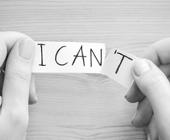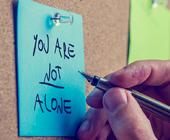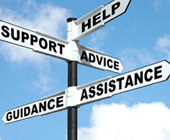Anorexia Nervosa: Development and Treatment
Find out how some people develop Anorexia Nervosa and the treatment for Anorexia Nervosa.
Most of us worry about our weight....many of us are overweight or obese, and would love to lose those excess pounds. But there are those who worry about just the opposite, that is "gaining weight." Many who suffer from that worry are suffering from an "eating disorder," especially Anorexia Nervosa or Bulimia Nervosa. In Anorexia Nervosa the underlying concern is a fear of getting fat or gaining weight. There are many psychological issues associated with the fear of gaining weight, such as psychological control, perfectionism, and anxiety.
Most of those suffering from Anorexia Nervosa are females, with males accounting for only 10% of the sufferers. The onset of this eating disorder is usually in adolescense or young adulthood. Although there are many things that can start the process leading to the onset of Anorexia, it is often something quite innocuous such as someone saying something like "she is getting fat" or saying that someone quite thin looks "good."
To those predisposed to developing the problem, this can be the "last straw" that sets into motion an overwhelming pursuit of thinness, a fear of getting fat and "losing control." The behavior that goes with this concern is eating less and less -- often little more that salads and vegetables, but foods with very few calories and almost no nutritional value. The end result is a loss of weight, often to the point of development of health problems such as thinning of bones, drop in body temperature (causing a continuous feeling of cold), loss of periods in females, heart problems and sometimes death. To make matters worse, those with diagnosed with Anorexia Nervosa develop a distorted body image such that although the patient's body may be dangerously thin, when they look in the mirror they see themselves as fat. This causes the disease to continue despite concern of family and friends, and even advice of physicians to change the behavior.
Treatment for Anorexia Nervosa
It is difficult to get sufferers into treatment, but treatment is possible. Treatment of Anorexia Nervosa involves restoring the patient to a healthy weight and nutritional status, treating the psychological issues associated with the eating disorder - including the distorted body image, dealing with the behaviors involved, and treating the anxiety, guilt, control and other issues.
Other eating disorders involve: binging (eating large amounts of food in a short timespan) and purging (through vomiting, and laxative or exercise abuse) called bulimia nervosa, and binging secondary to psychological issues called Eating Disorders not otherwise specified (NOS) or "binge eating disorder."
More information about the difficulty in recovery from and treatment of eating disorders is available on the HealthyPlace Eating Disorders Community.
On the HealthyPlace TV Show on eating disorders treatment, Tuesday June 2, (7:30p CT, 8:30 ET live and on-demand on our website), we will discuss why it's so difficult to recover from Anorexia and Bulimia.
Dr. Harry Croft is a Board-Certified Psychiatrist and Medical Director of HealthyPlace.com. Dr. Croft is also the co-host of the HealthyPlace TV Show.
next: Treating Sexual Addiction
~ other mental health articles by Dr. Croft
APA Reference
(2009, June 2). Anorexia Nervosa: Development and Treatment, HealthyPlace. Retrieved
on 2025, December 7 from https://www.healthyplace.com/about-hptv/croft-blog/anorexia-nervosa-development-and-treatment

 To be on that journey is to be on your path to health and emotional and intellectual development. Your path leads to your true self, to your inner resources of courage, creativity, self respect, strength and ability to be committed and dedicated.
To be on that journey is to be on your path to health and emotional and intellectual development. Your path leads to your true self, to your inner resources of courage, creativity, self respect, strength and ability to be committed and dedicated. Summary: Relationships change as you make progress toward solid recovery. Joanna helps you understand which relationships can last and which can't so you can be sturdy and kind to yourself and proceed on your path to a new and more healthy life.
Summary: Relationships change as you make progress toward solid recovery. Joanna helps you understand which relationships can last and which can't so you can be sturdy and kind to yourself and proceed on your path to a new and more healthy life.




































 As talk of the banking crisis, falling housing prices, rising consumer debt and declining retail sales bring up worries about the nation's economic health, more Americans feel additional stress and anxiety about their financial future.
As talk of the banking crisis, falling housing prices, rising consumer debt and declining retail sales bring up worries about the nation's economic health, more Americans feel additional stress and anxiety about their financial future. As job losses soar and the media continues to report on falling stock prices and rising foreclosures, many people may react to the economic climate with a flood of strong emotions and a sense of uncertainty. Yet, people generally adapt well over time to life-changing situations and stressful conditions.
As job losses soar and the media continues to report on falling stock prices and rising foreclosures, many people may react to the economic climate with a flood of strong emotions and a sense of uncertainty. Yet, people generally adapt well over time to life-changing situations and stressful conditions. Social anxiety isn't as simple as just being shy; it can be emotionally and academically paralyzing, even for children. The author writes about her daughter's struggle and victory over this debilitating problem.
Social anxiety isn't as simple as just being shy; it can be emotionally and academically paralyzing, even for children. The author writes about her daughter's struggle and victory over this debilitating problem.